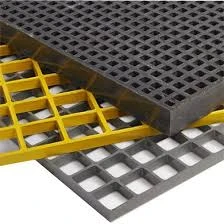loading...
- No. 9, Xingyuan South Street, Dongwaihuan Road, Zaoqiang County, Hengshui, Hebei, China
- admin@zjcomposites.com
- +86 15097380338
- Welcome to visit our website!
frp grill
The Rise of FRP Grills A Modern Approach to Engineered Solutions
In recent years, the shift towards advanced materials in various applications has revolutionized industries worldwide. One such innovation is the use of Fiber Reinforced Polymer (FRP) grills, which are increasingly becoming a preferred choice for industrial and commercial uses. This article explores the attributes, benefits, and applications of FRP grills.
Understanding FRP
FRP, or Fiber Reinforced Polymer, is a composite material that consists of a polymer matrix reinforced with fibers, typically glass or carbon. This combination results in a material that boasts an excellent strength-to-weight ratio, high durability, and resistance to environmental factors. The lightweight nature of FRP makes it easier to handle and install compared to traditional materials like steel or concrete.
Advantages of FRP Grills
1. Corrosion Resistance One of the standout features of FRP grills is their resistance to corrosion, making them ideal for use in harsh environments, such as chemical plants or coastal areas. Unlike metal grills, which can rust or deteriorate over time when exposed to moisture or chemicals, FRP maintains its integrity and appearance.
2. Lightweight Construction FRP grills are significantly lighter than their metal counterparts, which translates to easier installation and reduced labor costs. This lightweight property also simplifies transportation, allowing for more efficient operations in various settings.
3. Design Flexibility The manufacturing process for FRP grills allows for versatile designs and customization. Manufacturers can produce grills in different shapes, sizes, and colors to meet specific project requirements. This flexibility is particularly beneficial for architects and designers looking to incorporate aesthetically pleasing elements into their projects.
frp grill

4. Low Maintenance Once installed, FRP grills require minimal maintenance. Their resistance to UV rays, moisture, and chemicals means that they maintain their structural and visual integrity over time, leading to cost savings in repairs and upkeep.
5. Safety Features Many FRP grills come with slip-resistant surfaces, enhancing safety in environments where footing is crucial. This feature is particularly valuable in industrial facilities, walkways, and platforms.
Applications of FRP Grills
FRP grills have found applications across various fields due to their remarkable properties. In the construction industry, they are used for staircases, walkways, and safety barriers. Their corrosion resistance makes them a perfect choice for wastewater treatment plants and water treatment facilities, where exposure to harsh chemicals and moisture is common.
Moreover, FRP grills are increasingly utilized in the oil and gas sector, where they serve as flooring and platforms in refineries and offshore rigs due to their lightweight nature and resistance to chemical corrosion. Similarly, in the food processing industry, FRP grills comply with health regulations while providing the durability needed in high-traffic environments.
Conclusion
The growing popularity of FRP grills is a testament to the search for materials that meet modern engineering demands. Their unique blend of strength, lightweight construction, corrosion resistance, and design flexibility makes them a valuable asset in various industrial applications. As industries continue to seek innovative and cost-effective solutions, FRP grills are poised to play a crucial role in shaping the future of building and infrastructure. Embracing such advanced materials not only enhances the performance of structures but also aligns with sustainability goals, minimizing the environmental impact associated with traditional materials.
-
The Rise of FRP Profiles: Strong, Lightweight, and Built to LastNewsJul.14,2025
-
SMC Panel Tanks: A Modern Water Storage Solution for All EnvironmentsNewsJul.14,2025
-
GRP Grating: A Modern Solution for Safe and Durable Access SystemsNewsJul.14,2025
-
Galvanized Steel Water Tanks: Durable, Reliable, and Ready for UseNewsJul.14,2025
-
FRP Mini Mesh Grating: The Safer, Smarter Flooring SolutionNewsJul.14,2025
-
Exploring FRP Vessels: Durable Solutions for Modern Fluid HandlingNewsJul.14,2025
-
GRP Structures: The Future of Lightweight, High-Performance EngineeringNewsJun.20,2025
